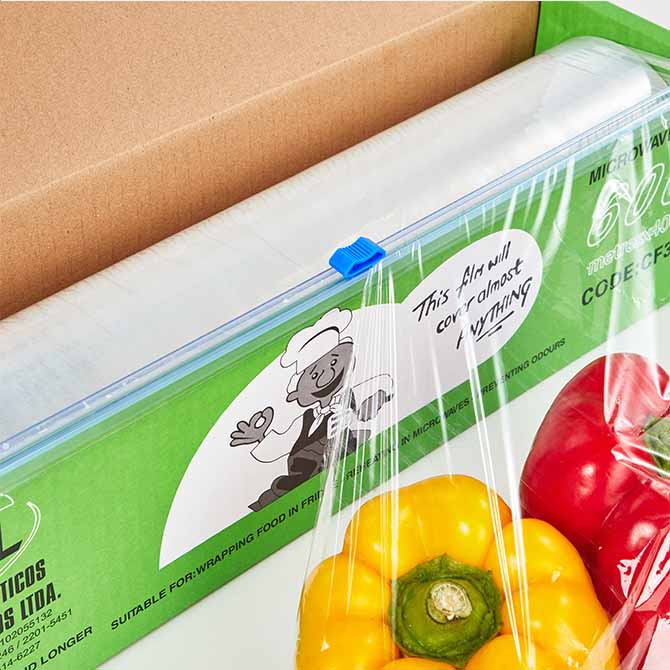We are committed to food packaging PVC cling film, PE cling film,stretch wrap, aluminum foil and other disposal food packing film/foil.

Language
>Cling Food Wrap Manufacturing: A Shift Toward Sustainability and Technological Innovation
Cling Food Wrap, an essential packaging material in everyday life, plays a vital role in both household and commercial settings. As consumer awareness about environmental issues increases and technology continues to advance, the food wrap manufacturing industry is undergoing a profound transformation. This article explores the innovations in materials, quality control, market demand, production technology, and environmental impact within the industry, analyzing the challenges and opportunities it faces in the era of modernization.

Material Innovation and Technological Development
Traditional food wraps are primarily made from materials like polyethylene (PE) and polyvinyl chloride (PVC). Polyethylene is commonly used in households due to its low production costs and strong adhesive properties. Polyvinyl chloride, on the other hand, is favored in commercial applications for its transparency and excellent stretch resistance. However, as environmental concerns grow, many manufacturers are shifting toward more eco-friendly materials. For example, some companies have begun using biodegradable bioplastics such as polylactic acid (PLA) to reduce plastic waste.
A certain company recently launched a food wrap made from plant-based materials, using biodegradable substances. This product not only extends the freshness of food but also naturally decomposes under certain conditions. Compared to traditional plastic, this eco-friendly wrap helps reduce plastic waste, offering consumers a more sustainable option.
Strict Quality Control and Standards
Food safety has always been a crucial issue in food wrap manufacturing. To ensure products meet food-grade safety standards, many manufacturers implement strict quality control measures throughout the production process. For instance, all raw materials undergo hygiene and safety testing to ensure they do not contain harmful substances such as phthalates or heavy metals. Additionally, some products are labeled “BPA-free” (bisphenol A-free), further reassuring consumers about their safety.
A certain factory has established a comprehensive quality control system to ensure that each roll of food wrap undergoes rigorous testing. From the production line to the consumer's hands, the product’s safety and high quality are guaranteed. This not only helps the company build a solid brand reputation but also strengthens consumer trust.
Market Demand and Consumer Trends
As consumers become more health-conscious and environmentally aware, the demand for food wraps is also evolving. While traditional food wraps continue to dominate many households, consumer preferences are increasingly shifting toward eco-friendly, biodegradable products. Many consumers now prefer food wraps made from natural or biodegradable materials to reduce their reliance on single-use plastics.
According to market research data, eco-friendly packaging accounted for about 12% of the global packaging market in 2019, and this proportion is expected to grow to 25% by 2025. With this growing trend, more and more food wrap manufacturers are launching eco-conscious products to capture a larger share of this rapidly expanding market.
Technological Innovation in Production
With the advancement of automation and technology, many manufacturers have optimized production processes to improve the efficiency of food wrap manufacturing. Modern production equipment, such as high-efficiency blown film and stretch film machinery, allows for more precise and efficient production of food wraps. These technologies enable manufacturers to create thinner yet stronger wraps, reducing production costs and enhancing product competitiveness.
A certain factory has significantly improved production efficiency by introducing automated production lines, reducing human error and minimizing manufacturing costs. Moreover, the advanced equipment enables the production of thinner yet stronger films, meeting the growing demand for lightweight packaging materials. These continuous technological innovations not only push the modernization of food wrap manufacturing but also give companies a competitive edge in an increasingly fierce market.
Environmental Challenges and Sustainability
With the global focus on plastic pollution intensifying, the food wrap manufacturing industry faces significant environmental pressures. Traditional plastic wraps are often non-biodegradable and contribute to plastic waste once disposed of. To address this challenge, many food wrap manufacturers are actively developing biodegradable or reusable alternatives to reduce their environmental impact.
A certain company has successfully created biodegradable food wraps made from bioplastics, which decompose naturally within a few months. This product helps to prevent large amounts of plastic waste, offering a more sustainable solution. Despite its higher production costs, as consumer awareness of eco-friendly products increases, the demand for such products is steadily rising.
However, although biodegradable materials help mitigate environmental pollution, the production of these materials still faces challenges, such as sourcing raw materials and controlling costs. Biodegradable materials are more expensive to produce than traditional plastics, which remains a major hurdle. Therefore, finding a balance between sustainability and cost control is a key challenge for food wrap manufacturers.
Conclusion
The food wrap manufacturing industry is undergoing a rapid transformation in an era of modernization. From material innovation and production technology to growing environmental concerns, each step in the industry's evolution provides consumers with safer, more eco-friendly, and efficient products. As global attention on sustainable development and green packaging continues to rise, the future of food wrap manufacturing holds many possibilities.
Manufacturers need to keep up with market trends, explore new production techniques, and develop innovative products that meet consumer demands. Only through continuous technological innovation and a commitment to sustainability can companies stand out in the competitive market and embrace a brighter future.